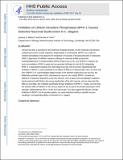Inhibition of Lithium-Sensitive Phosphatase BPNT-1 Causes Selective Neuronal Dysfunction in C. elegans
Author(s)
Meisel, Joshua Daniel; Kim, Dennis H.
Downloadnihms789804.pdf (1.228Mb)
PUBLISHER_CC
Publisher with Creative Commons License
Creative Commons Attribution
Terms of use
Metadata
Show full item recordAbstract
Lithium has been a mainstay for the treatment of bipolar disorder, yet the molecular mechanisms underlying its action remain enigmatic. Bisphosphate 3′-nucleotidase (BPNT-1) is a lithium-sensitive phosphatase that catalyzes the breakdown of cytosolic 3′-phosphoadenosine 5′-phosphate (PAP), a byproduct of sulfation reactions utilizing the universal sulfate group donor 3′-phosphoadenosine 5′-phosphosulfate (PAPS) [1–3]. Loss of BPNT-1 leads to the toxic accumulation of PAP in yeast and non-neuronal cell types in mice [4, 5]. Intriguingly, BPNT-1 is expressed throughout the mammalian brain [4], and it has been hypothesized that inhibition of BPNT-1 could contribute to the effects of lithium on behavior [5]. Here, we show that loss of BPNT-1 in Caenorhabditis elegans results in the selective dysfunction of two neurons, the bilaterally symmetric pair of ASJ chemosensory neurons. As a result, BPNT-1 mutants are defective in behaviors dependent on the ASJ neurons, such as dauer exit and pathogen avoidance. Acute treatment with lithium also causes dysfunction of the ASJ neurons, and we show that this effect is reversible and mediated specifically through inhibition of BPNT-1. Finally, we show that the selective effect of lithium on the nervous system is due in part to the limited expression of the cytosolic sulfotransferase SSU-1 in the ASJ neuron pair. Our data suggest that lithium, through inhibition of BPNT-1 in the nervous system, can cause selective toxicity to specific neurons, resulting in corresponding effects on behavior of C. elegans.
Date issued
2016-07Department
Massachusetts Institute of Technology. Department of BiologyJournal
Current Biology
Publisher
Elsevier
Citation
Meisel, Joshua D., and Dennis H. Kim. “Inhibition of Lithium-Sensitive Phosphatase BPNT-1 Causes Selective Neuronal Dysfunction in C. Elegans.” Current Biology 26, 14 (July 2016): 1922–1928 © 2016 Elsevier Ltd
Version: Author's final manuscript
ISSN
0960-9822
1879-0445